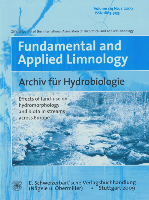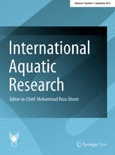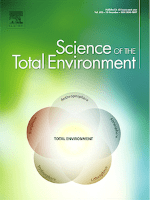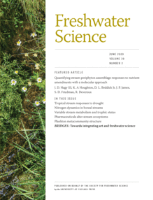
LIMNETICA
Scope & Guideline
Connecting researchers to the pulse of aquatic science.
Introduction
Aims and Scopes
- Freshwater Biodiversity and Ecology:
Research focusing on the diversity of freshwater species, including fish, macroinvertebrates, and phytoplankton, as well as their ecological relationships and community structures. - Impact of Anthropogenic Factors:
Studies investigating the effects of urbanization, agriculture, and pollution on freshwater ecosystems, emphasizing how these factors alter habitat quality and biodiversity. - Hydrology and Water Quality:
Research examining hydrological trends, water quality assessments, and the interactions between physical and chemical factors affecting aquatic environments. - Conservation and Management:
Papers that focus on conservation strategies, restoration efforts, and sustainable management of freshwater resources, highlighting the importance of protecting aquatic biodiversity. - Emerging Contaminants and Ecotoxicology:
Research addressing the effects of pollutants, including microplastics and agrochemicals, on aquatic organisms and ecosystems, contributing to the understanding of ecological risks.
Trending and Emerging
- Climate Change Impacts:
An increasing number of studies are focusing on how climate change affects hydrology, species distributions, and ecosystem functioning, emphasizing the urgent need to understand and mitigate these impacts. - Microplastics and Pollution:
Research on microplastics and their effects on aquatic organisms is gaining momentum, highlighting concerns about pollution and the health of freshwater ecosystems. - Ecological Restoration and Management:
There is a growing trend towards studies that evaluate restoration techniques and management practices aimed at improving the ecological integrity of freshwater systems. - Functional Ecology and Ecosystem Services:
Emerging themes include the study of functional traits of species and their contributions to ecosystem services, which is crucial for understanding the role of biodiversity in maintaining ecosystem health. - Citizen Science and Educational Approaches:
The integration of citizen science in ecological research and educational initiatives is becoming more prominent, reflecting a trend towards engaging the public in scientific inquiry and environmental stewardship.
Declining or Waning
- Traditional Taxonomy Studies:
Research papers primarily focused on taxonomic descriptions and classifications of species have decreased, possibly due to the increasing emphasis on ecological and functional studies over pure taxonomic work. - Historical Limnology:
Studies that emphasize historical perspectives of freshwater systems, such as long-term ecological changes without direct relevance to current biodiversity or management issues, have become less frequent. - Single-species Studies:
There is a noticeable reduction in studies that focus solely on single species without broader ecological context, as interdisciplinary approaches that consider community dynamics gain more traction.
Similar Journals

Fundamental and Applied Limnology
Discovering Biodiversity: Essential Insights for Ecological ProgressFundamental and Applied Limnology is an esteemed academic journal dedicated to the exploration of freshwater ecosystems, bridging the gap between fundamental research and practical applications. Published by E Schweizerbart'sche Verlagsbuchhandlung in Germany, this journal has been a vital resource in the fields of aquatic science and ecology since its inception in 2007. With its ISSN 1863-9135 and E-ISSN 1863-9135, it provides a platform for researchers to disseminate significant findings related to limnology, contributing to a rich understanding of freshwater biodiversity, water quality, and ecological interactions. Although currently rated in the Q3 quartile for aquatic sciences and ecology as per the 2023 rankings, it remains a valuable outlet for interdisciplinary research and practical insights, facilitating critical advancements in environmental management. Open access options enhance its visibility and accessibility, making it indispensable for researchers, professionals, and students alike who are committed to advancing the scholarship in freshwater studies. Engaging with this journal not only opens doors to the latest research findings but also fosters collaboration and innovation in the ecological community.

International Aquatic Research
Connecting researchers to the pulse of aquatic ecosystems.International Aquatic Research, published by the Islamic Azad University, Tonekabon Branch, is a vital open-access journal dedicated to advancing the field of aquatic sciences since its inception in 2009. With an ISSN of 2008-4935 and an E-ISSN of 2008-6970, the journal plays a significant role in disseminating high-quality research findings from Iran and around the globe. It covers a broad range of topics in aquatic biology, fisheries science, and marine ecology, making it a valuable resource for researchers, professionals, and students alike. As of 2023, it ranks in the third quartile (Q3) of the aquatic science category with a Scopus rank of #138 out of 247 in Agricultural and Biological Sciences, reflecting its growing influence in the field. With a commitment to promoting scientific knowledge and fostering collaboration among aquatic research communities, International Aquatic Research is positioned as an essential platform for those dedicated to understanding and conserving marine and freshwater environments.

Science of The Total Environment
Pioneering Insights in Environmental ScienceScience of The Total Environment, an esteemed journal published by Elsevier, holds a significant position in the field of environmental science, encompassing critical areas such as Environmental Chemistry, Environmental Engineering, Pollution, and Waste Management and Disposal. With an impressive impact factor and ranked in the Q1 quartile across its categories for 2023, the journal is recognized for its high-quality research output and contribution to environmental sustainability. Operating from its base in the Netherlands, the journal has been a valuable resource since its inception in 1972, welcoming innovative studies that address complex environmental challenges. Its notable rankings—such as Rank #9 in both Environmental Sciences and Pollution—underscore its relevance and influence in the academic community. Although the journal currently does not provide an open access option, the robust findings and discussions presented within its pages continue to foster a deeper understanding of environmental issues. Science of The Total Environment is an essential platform for researchers, professionals, and students dedicated to advancing knowledge and solutions in the rapidly evolving field of environmental science.

Hidrobiologica
Bridging local insights with global aquatic challenges.Hidrobiologica is a pivotal academic journal dedicated to the field of aquatic sciences and ecology, published by UNIV AUTONOMA METROPOLITANA-IZTAPALAPA in Mexico. With a commitment to fostering research from diverse ecosystems, this journal encourages the dissemination of knowledge spanning aquatic environments, ecological interactions, and marine biodiversity. Although classified in the Q4 category across various relevant fields such as Aquatic Science and Oceanography, Hidrobiologica is focused on increasing visibility and engagement among scholars by providing a platform for innovative research that addresses contemporary ecological challenges. The journal's address reflects its deep-rooted commitment to local and regional aquatic research, yet it aims to resonate with a global audience. Researchers, professionals, and students alike will find value in the journal's scope, which spans from 2007 to 2024, making it a valuable resource for understanding advancements in aquatic studies. While not an open-access journal, it continues to be a significant contributor to the academic dialogue in aquatic sciences.

Journal of Oceanology and Limnology
Bridging Disciplines for a Healthier PlanetJournal of Oceanology and Limnology, published by SCIENCE PRESS, is a premier academic journal dedicated to advancing the fields of oceanography and limnology. With an ISSN of 2096-5508 and E-ISSN 2523-3521, this journal has emerged as a vital resource since its inception, aiming to disseminate cutting-edge research and comprehensive studies on aquatic environments. Based in China and indexed with notable rankings in Scopus, including a Q2 category in Oceanography and a Q3 category in Water Science and Technology, this journal significantly contributes to knowledge in these crucial scientific disciplines. The H-index for the journal is currently being established, reflecting its evolving impact within the academic community. Moreover, the open access model promotes wider dissemination, ensuring that research findings are accessible to a global audience. Covering a diverse range of topics from ecosystem health to climate impact on water bodies, the Journal of Oceanology and Limnology aspires to foster interdisciplinary dialogue and innovation among researchers, professionals, and students engaged in understanding and preserving aquatic life.

Water Biology and Security
Innovating solutions for water resources and ecosystems.Water Biology and Security, published by KEAI PUBLISHING LTD, is a pivotal open-access journal that has been addressing critical issues in the interdisciplinary fields of water sciences, aquatic biology, and environmental sustainability since its inception in 2022. With an E-ISSN of 2772-7351 and a distinguished ranking within the top quartile (Q1) of several categories including Agricultural and Biological Sciences, Animal Science and Zoology, Aquatic Science, and Water Science and Technology, the journal stands out as a leading platform for innovative research. Based in Beijing, China, and supported by an impressive impact factor derived from its Scopus rankings, the journal aims to disseminate high-quality and impactful research that addresses the challenges related to water resources and ecosystems. Its open-access format enhances accessibility, ensuring that vital information reaches policymakers, practitioners, and scholars worldwide. As we converge through 2024, the journal aspires to foster a vibrant scholarly community, facilitating dialogues that inform practice and advance the scientific understanding of aquatic environments.

Freshwater Science
Connecting Researchers for a Thriving Aquatic FutureFreshwater Science is a pivotal journal published by the University of Chicago Press, dedicated to advancing the understanding of freshwater ecosystems and their biodiversity. With an ISSN of 2161-9549 and an E-ISSN of 2161-9565, this journal has been a vital resource in the fields of Aquatic Science and Ecology, consistently ranked in the Q2 quartile across multiple categories in 2023. The journal encapsulates rigorous research and innovative studies aimed at addressing the ecological dynamics of freshwater environments from 2012 to 2024. Researchers and practitioners benefit from its open access options, which enhance the dissemination of knowledge while contributing to a better understanding of aquatic systems. With Scopus rankings that place it in the top 30% of its fields, Freshwater Science plays an influential role in fostering scientific dialogue and collaboration among professionals, making it an essential publication for anyone invested in freshwater conservation, management, and ecological impact.

International Journal of Limnology
Transforming Aquatic Science through Open AccessThe International Journal of Limnology, published by EDP SCIENCES S A, is a cutting-edge journal dedicated to the field of aquatic sciences, with a strong emphasis on limnology—the study of inland waters. Headquartered in France, the journal serves as a vital resource for scholars and practitioners alike, aiming to advance the understanding of freshwater ecosystems and their management. With an e-ISSN of 2823-1465 and classified within the Q3 category of the 2023 Aquatic Science quartiles, it occupies a significant niche in academic research, ranking 150 out of 247 in Scopus listings. The journal’s open access policy ensures that research findings are widely disseminated, facilitating collaboration and innovation across global aquatic science communities. Published continuously from 2022 to 2024, the International Journal of Limnology aspires to contribute to sustainable practices and enhance ecological understanding, making it an essential publication for researchers, professionals, and students committed to the stewardship of aquatic resources.

Journal of Ecohydraulics
Leading the way in impactful ecohydraulic research.The Journal of Ecohydraulics, published by Taylor & Francis Ltd, stands as a premier platform for interdisciplinary research, merging the disciplines of civil engineering, water science, and environmental management. With an ISSN of 2470-5357 and an E-ISSN of 2470-5365, this esteemed journal, based in the United Kingdom, has been recognized within the top quartile (Q1) in both Civil and Structural Engineering and Water Science and Technology categories. Its impactful research, reflected in its notable Scopus rankings—#40 out of 261 in Environmental Science and #69 out of 379 in Engineering—underscores its vital role in advancing knowledge and addressing the critical challenges posed by the interaction of ecological and hydraulic systems. The journal invites contributions that explore innovative methodologies and sustainable practices relevant to ecohydraulics, fostering a robust dialogue among researchers, professionals, and students interested in the sustainable management of aquatic and terrestrial environments.

MARINE AND FRESHWATER RESEARCH
Pioneering insights into aquatic ecology and sustainability.Marine and Freshwater Research is a prestigious journal published by CSIRO PUBLISHING that serves as a key platform for the dissemination of cutting-edge research in the fields of Aquatic Science, Ecology, and Oceanography. With an impactful presence since its inception in 1948, the journal provides critical insights into the dynamics of freshwater and marine ecosystems, promoting interdisciplinary approaches that contribute to our understanding of biodiversity and sustainability. Currently ranked in the Q2 category across major scientific domains, including Ecology and Aquatic Science, it enjoys a robust academic reputation supported by impressive Scopus rankings, such as Rank #66/247 in Aquatic Science and Rank #44/145 in Oceanography, reflecting its high citation impact and relevance. While offering a subscription-based access model, the journal remains dedicated to fostering dialogue and innovation within the scientific community, aiming to bridge the gap between research findings and practical applications in environmental management. Located in Australia, Marine and Freshwater Research is an essential resource for researchers, professionals, and students dedicated to exploring the complexities of aquatic ecosystems and advocating for their preservation.